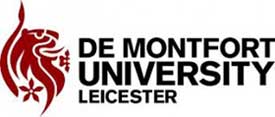About International Film Production MA in De Montfort University
This course will underpin your learning with industry-led insight and expertise, mixing professional knowledge and skills with academic critical thinking about films, audiences and the film industry.
You will enhance your filmmaking skills while developing a range of core skills and expertise in business and production management. These include scriptwriting, lighting and cinematography, directing and post-production, pitching, budgeting and management.
Further your knowledge of key roles in the film industry and the production process by learning about screenwriting and digital film and audio capture. As your studies progress you will develop your own projects under the guidance of our expert staff, with modules covering pre-production and production, equipping you for your final dissertation or individual film project.
You will benefit from the expertise of research groups such as the Cinema and Television History Research Institute (CATHI) and the Institute of Creative Technologies. The specialist skills you will develop are ideal for opening up careers in film, TV and media.
Key features
- Tailor your learning towards your career aspirations with your final semester project. Choose between writing a traditional dissertation or submitting an individual film project. This work is an opportunity to demonstrate the skills and knowledge developed on the course and will form the basis of your professional portfolio.
- Access our Creative Technology Studios, equipped with industry-standard video, audio and radio production suites. These studios provide facilities for the acquisition, editing and distribution of video, audio and computer-generated materials, enabling a seamless mixed-media workflow. You will also have access to a range of specialist film production equipment through our audio-visual loans service.
- DMU is home to the Cinema and Television History Research Institute (CATHI) which houses archives from a range of leading UK production companies. In the latest Research Excellence Framework, 100 per cent of CATHI’s research impact was judged to be ‘world-leading’ or ‘internationally excellent’.
- Enhance your learning and network with professionals at our guest lectures and workshops, featuring speakers from across the industry.
- Meet like-minded people and get hands-on experience by joining our student societies, including our award-winning media society, Demon Media, and Film Debate, who meet weekly to screen movies and debate related topics.
- Prepare for a career in industry or for future study. This MA, with its focus on individual research, provides ideal preparation for progression to a PhD.
Entry criteria
You should have the equivalent of a British Honours degree (2:2 minimum) in a relevant subject.
We are happy to consider equivalent qualifications from anywhere in the world.
If English is not your first language an IELTS score of 6.0 or equivalent when you start the course is essential. English Language tuition, delivered by our British Council accredited Centre for English Language Learning, is available both before and throughout the course if you need it.
De Montfort University Highlights
| Type of Institution |
Public |
| Campus Setting |
Urban |
| Endowment |
£1.17 million |
| Number of Campuses |
4 faculties |
| Number/Percentage of International Students |
23205 |
| Total number of Professors |
3240 |
| Student Satisfaction Rate |
86% |
| Graduate Job Rate |
97.3% |
| Number of Residence Vacancy |
Around 3000 |
| International fee |
Undergraduates- £13240 (annual) Postgraduates- £15950 (annual) |
| Number of Academic Programs |
UG, PG, Part time, distance, blended |
| Mode of Program |
Full time, distance and online |
| Average Graduate Salary |
19800 pounds a year |
De Montfort University The tuition fee (In GBP) for various programs is tabulated below:De Montfort University Average Cost
| Field of Study |
Avg.Fees |
| Art, Design and Humanities: |
£13,750 |
| Business and Law |
£13,750-£14,550 |
| Media |
£13,750 - £14,250 |
| Engineering |
£14,250 |
| Computing |
£14,250 |
| Health and Life Sciences |
£13,250 - £14,250 |
| Nursing BSc |
£14,950 |
De Montfort University The Average Tuition Fees and Other Expenses
| Expenses |
Estimated cost in pounds |
| Undergraduate tuition fee |
13,250- 14950 |
| Postgraduate tuition fee |
13600-15,900 |
| On campus accommodation |
5,000-6040 |
| Average cost of living |
97-110 per week |
DMU International Scholarship up to 1500 pounds
- TEF Gold Outstanding Alumni Scholarship up to 3000 pounds
- Leicester Castle Business School Scholarships:
- Global MBA Scholarship £3,000 - £5,000
- Full Postgraduate Scholarship
- LGBTQ + Allies Scholarship-two fully funded post graduate taught scholarship packages including full fee weaver and maintenance bursary.
- Vice Chancellor's Sports Scholarship- three different scholarship packages are available with eligible students being awarded up to 6000 pounds of support.
